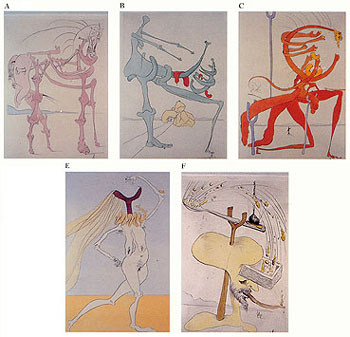





|
|
|
|
August 22, 2006
Hell as a loophole
"Everything about man is deception and falsehood."So concludes Francisco de Quevedo in his "Visions," one of which (from the following print series by Salvador Dali) has been staring me in the face for years.

As to the book which inspired Dali, while the original is alleged to be heavily censored, Quevedo's "Visions" has been described as "a brilliant and bitterly satiric account, after Dante and Lucan, of the inhabitants of hell." In writing "The Vision of Judgment" (considered his "finest finished poem"), Lord Byron used the name of "QUEVEDO REDIVIVUS." (Byron offers a reminder that Hell is paved with good intentions. Catch 22?) Historically, artists -- especially those from censored or uptight times or backgrounds -- have loved Hell. That's because in Hell all conventional boundaries disappear, and artistic license is virtually unlimited. Relativism is evil, and of course evil is relative. Yet because evil is presumed to be everywhere in Hell, there are no limits. Even presumably "good" men can be placed in Hell and properly belong there. Because religious scolds threaten all of us with Hell, and we are all sinners, no one is immune. Therefore, people can generally be placed in Hell with impunity -- especially in artistic "visions." Sending people to Hell cloaks an unsafe political attack with the safer mantle of religion. It's easy to understand why a 16th Century satirist would see Hell as the best possible value. For a satirist like Quevedo (with innumerable powerful enemies in the middle of the Spanish Inquisition) there was no bigger bang for the buck than this kind of Hell: A parade of the famous, the infamous, and commoners -- whole professional groupings, from innkeepers to poets -- get judged, each approaching it in their own fashion (what a sight the philosophers made, "chopping logic to fashion their syllogisms about salvation"). It's a quick roll-call, but almost each line delivers the targets: "There followed three or four rich Genoese, seeking salvation along with banking concessions." And their fates are also all appropriate -- so the whole gaggle of poets that is sent along with Orpheus back down into the Underworld, "to try whether, as an experiment, they could all emerge again." A nice scene has Judas, Mahommed, and Martin Luther together, each claiming to be the true Christ-betrayer Judas, much to the real one's chagrin.Hell has something for everybody! I'm so glad to own my own private part. But this is a public blog, and considering the times in which we live, I think Quevedo's quotation of Mohammad "defending his faith" might be of interest to modern readers: Let it simply be said that I wished my disciples sufficient ill to deprive them of glory in the life hereafter, and pork and wine skins while on Earth. And in the end I decreed that my doctrines should not be defended by reason (for there is none to be found in either obeying or advocating them) so committing them instead into the hands of armed night I set my followers off upon lives of unending din and clamour.Personally, I find such din and clamor to be very dull. Deadly dull. No wonder I'm looking for loopholes. posted by Eric on 08.22.06 at 09:17 AM |
|
March 2007
WORLD-WIDE CALENDAR
Search the Site
E-mail
Classics To Go
Archives
March 2007
February 2007 January 2007 December 2006 November 2006 October 2006 September 2006 August 2006 July 2006 June 2006 May 2006 April 2006 March 2006 February 2006 January 2006 December 2005 November 2005 October 2005 September 2005 August 2005 July 2005 June 2005 May 2005 April 2005 March 2005 February 2005 January 2005 December 2004 November 2004 October 2004 September 2004 August 2004 July 2004 June 2004 May 2004 April 2004 March 2004 February 2004 January 2004 December 2003 November 2003 October 2003 September 2003 August 2003 July 2003 June 2003 May 2003 May 2002 See more archives here Old (Blogspot) archives
Recent Entries
• War For Profit
• How trying to prevent genocide becomes genocide • I Have Not Yet Begun To Fight • Wind Boom • Isaiah Washington, victim • Hippie Shirts • A cunning exercise in liberation linguistics? • Sometimes unprincipled demagogues are better than principled activists • PETA agrees -- with me! • The high pitched squeal of small carbon footprints
Links
Site Credits
|
|